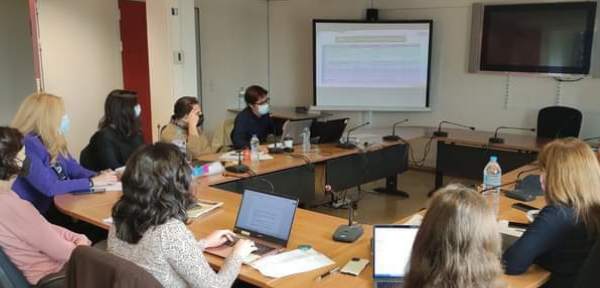Reforming the support for development of family centred early childhood intervention services in Greece

Over the past two years, EASPD had been working closely with the Greek government, local stakeholders, and DG REFORM, in implementing the Technical Support on the deinstitutionalisation (DI) process in the Greece project, funded by the Structural Reform Support Programme.
One of the clear conclusions highlighted within the project was that effective deinstitutionalisation needs a coherent and holistic framework to early childhood intervention as a first crucial step on the path to inclusion. For a chance at an inclusive society, we need to develop quality, community-based, family-centred early childhood intervention (ECI) services.
The Technical Support to implement reforms to support the development of family centred early childhood intervention services in Greece otherwise known as the ‘ECI Greece’ project, which began in October 2021 and is funded by the same programme, aims to reform the ECI system in Greece.
The project will support the Greek government in developing a modern evidence-based legislative and financial framework for early childhood intervention services as a crucial step towards deinstitutionalisation, and the effective inclusion of children with disabilities in society and their families through quality and adapted care and support. This project was designed from the experience of the ECI Agora project which had similar objectives and outcomes for Poland, Slovakia, Hungary, Romania, and Bulgaria.
ECI Greece project looks to complete several key actions including:
- Develop a training for Greek service providers based on good practice examples from EU countries and the training developed in the ECI Agora project
- Pilot these new methodologies for a year with several Greek service providers
- Develop a comprehensive country report on early childhood intervention in Greece as the groundwork for a shared understanding of what ECI is, the state of funding and outlining the needs of service providers.
- Support awareness-raising activities targeted, among others, at public authorities, assessment services, medical staff, and families,
- Develop a roadmap, an action plan with the aim of developing a sustainable and holistic legislative and financial framework that supports family centred ECI.
To kick off the project, the ECI Greece project held its first transnational meeting in Athens, Greece with several key stakeholders in November 2021.
On the first day, meetings were held with both the European Commission and the Ministry of Social Cohesion and Family Affairs to discuss the project objectives and implementation. EASPD also met with the Greek service providers who will take part in the pilots that will begin in 2022. The pilot implementation will be assessed to measure differences between the service provided before and after the project’s methodology.
Day two included meetings with key stakeholders in Greece committed to supporting a family centred ECI approach. Some of the partners involved included the parent’s association (POSGAMEA), UNICEF, the Deputy Ombudswoman for Children’s Rights, representatives from the Ministry of Education and The Greek "NETWORK" of Service Providers for People with Disabilities, a recently established network which aims to promote scientific and documented methods of development, education, and rehabilitation for persons with disabilities in Greece.
The next steps of the project will focus on developing the training on family centred ECI processes to be delivered to the pilot organizations. EASPD will ensure the trainings are of high-quality and adapted to the needs of Greek service providers and will start laying the foundations for the creation of the country report, beginning with the identification of a definition for ECI.
Funding and Disclaimer
Grant agreement number: n.101048313. This project is funded by the European Union's Technical Support Instrument and implemented in co-operation with the European Commission’s Directorate-General for Structural Reform Support.
The information and views set out in this article are those of the author(s) and do not necessarily reflect the official opinion of the Commission. The Commission does not guarantee the accuracy of the data included in this article. Neither the Commission nor any person acting on the Commission’s behalf may be held responsible for the use, which may be made of the information contained therein.

